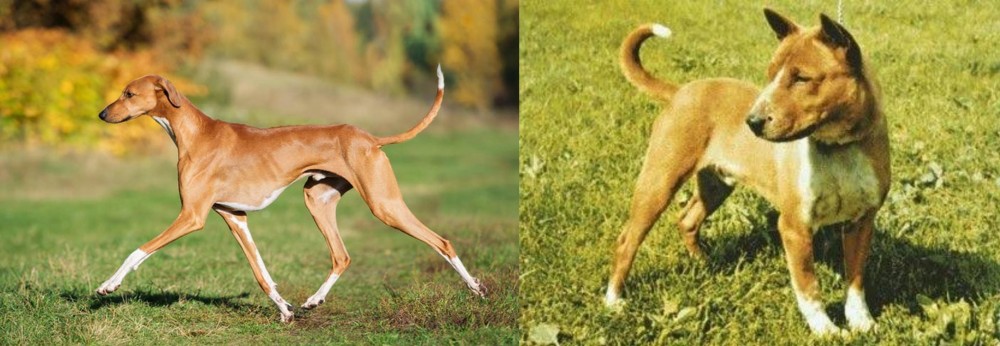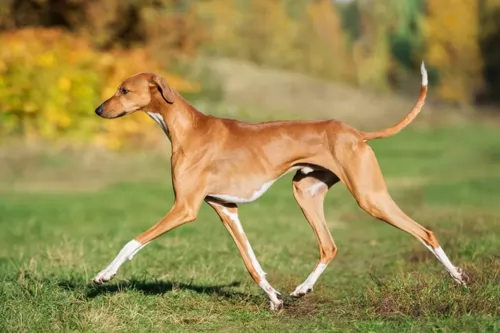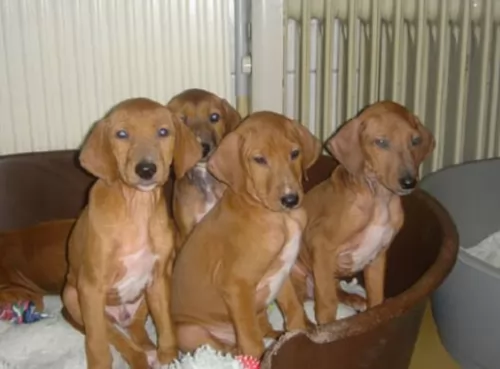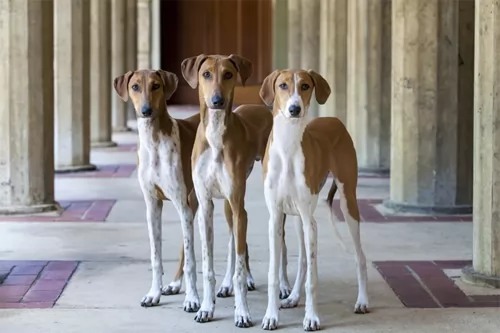 Petzlover
Petzlover Azawakh is originated from Mali but Telomian is originated from Malaysia. Azawakh may grow 27 cm / 11 inches higher than Telomian. Azawakh may weigh 12 kg / 27 pounds more than Telomian. Both Azawakh and Telomian has almost same life span. Both Azawakh and Telomian has almost same litter size. Both Azawakh and Telomian requires Moderate Maintenance.
Azawakh is originated from Mali but Telomian is originated from Malaysia. Azawakh may grow 27 cm / 11 inches higher than Telomian. Azawakh may weigh 12 kg / 27 pounds more than Telomian. Both Azawakh and Telomian has almost same life span. Both Azawakh and Telomian has almost same litter size. Both Azawakh and Telomian requires Moderate Maintenance.
 Azawakh dog was bred by the nomads in Africa. They were originally bred to be a guard dog. But, they realized that their body shape and bone structure allows them to run really fast (some say that they can run at the speed more than 65 km/h. This fact made them ideal for the hunting. Nowadays, they can be found across the globe but they are still very rare kind of a dog because they can survive and adapt to very high temperatures but they are very intolerant of low temperatures. Male Azawakh is slightly bigger than a female dog, with a greater instinct for guarding, hunting and taking care of the family and the pact.
Azawakh dog was bred by the nomads in Africa. They were originally bred to be a guard dog. But, they realized that their body shape and bone structure allows them to run really fast (some say that they can run at the speed more than 65 km/h. This fact made them ideal for the hunting. Nowadays, they can be found across the globe but they are still very rare kind of a dog because they can survive and adapt to very high temperatures but they are very intolerant of low temperatures. Male Azawakh is slightly bigger than a female dog, with a greater instinct for guarding, hunting and taking care of the family and the pact.
 The Telomian, out of Malaysia is rare and the only dog bred in Malaysia that lives outside the country. The breed was originally called Village dog or Anjing Kampung in Malay. The Telo is still considered one of the rarest dogs in the world. They are considered as a possible missing link between the Australian Dingo and the African Basenji.
The Telomian, out of Malaysia is rare and the only dog bred in Malaysia that lives outside the country. The breed was originally called Village dog or Anjing Kampung in Malay. The Telo is still considered one of the rarest dogs in the world. They are considered as a possible missing link between the Australian Dingo and the African Basenji.
They were bred to kill vermin by indigenous people, the Orang Asli of Malasia. They have an amazing ability to climb bred into them because these indigenous people lived in stilt houses. Even as they kept the Theomian to hunt vermian, the Orang Asli believed dogs were evil spirits who would eventually turn on them.
In 1963, Dr. Orville Elliot, an anthropologist from the West, discovered the breed and named them the Telomian for the Telom River they lived near. He took a pair to the United States and by 1970 there was a Telomian Dog Club in the U.S. By 1973 another pair had been imported and it is thought that all the Telomians who live in the United States today are descendants of these two pairs.
Like the New Guinea Singing Dog and the Basenji, the Telo do not bark but rather have a unique howl. Being bred from wild dogs, the Telo is not fully domesticate and puppies need a lot of socialization. The Telomian is on the Dog Registry of America Inc and America’s Pet Registry but is not recognized by any pedigree registry.
 Azawakh is a large dog breed placed in a family of the hounds. It looks almost like any hound we know – slim, with long and skinny legs, with a big-boned chest with a stomach placed up with the spine. They have thin and a bit longer tail, narrow nose and small skull in a triangle shape. Their body may look skinny but it is just the way they should look. Actually, you could probably see the bone structure of the adult Azawakh because they, like any other hounds, have specific muscles – very thin and flat. They can be found in many coat colours like sand, fawn or dark fawn, even brown. Their coat is very short, usually with white marks on the neck, chest and all four paws. In Africa, Azawakh can be found in a diversity of colours.
Azawakh is a large dog breed placed in a family of the hounds. It looks almost like any hound we know – slim, with long and skinny legs, with a big-boned chest with a stomach placed up with the spine. They have thin and a bit longer tail, narrow nose and small skull in a triangle shape. Their body may look skinny but it is just the way they should look. Actually, you could probably see the bone structure of the adult Azawakh because they, like any other hounds, have specific muscles – very thin and flat. They can be found in many coat colours like sand, fawn or dark fawn, even brown. Their coat is very short, usually with white marks on the neck, chest and all four paws. In Africa, Azawakh can be found in a diversity of colours.
 This is a somewhat unique looking breed. They are small dogs, sturdy, athletic dogs with short coat, a square body and a long back. Their coat is smooth and sable and the ticking is white. They often have black masks and purple tongues. They are about 15-18 inches in height and weigh about 18-28 pounds. Their head is well proportioned and they have erect ears, almond shaped eyes and deep chests.
This is a somewhat unique looking breed. They are small dogs, sturdy, athletic dogs with short coat, a square body and a long back. Their coat is smooth and sable and the ticking is white. They often have black masks and purple tongues. They are about 15-18 inches in height and weigh about 18-28 pounds. Their head is well proportioned and they have erect ears, almond shaped eyes and deep chests.
The Telo is still so undomesticated that the female only comes into estrus once a year in September to October. They have great command of their paws and can use them more like cats or racoons. They climb with them and hold toys, objects or food in them. This is related to their need to climb since homes were built on stilts in the jungles of Malaysia.
 Once Azawakh is a part of the family, he will try to find his place. If you teach him that you are the main figure, they will be obedient and affectionate pet. They love children, and they will surely be always close to them, guarding them and making sure they are safe.
Once Azawakh is a part of the family, he will try to find his place. If you teach him that you are the main figure, they will be obedient and affectionate pet. They love children, and they will surely be always close to them, guarding them and making sure they are safe.
canine freestyle sports, heelwork to music competitions.
If your Azawakh pet is trained well and socialized, they can fit in almost anywhere. Some will say that they hate cats, but there are some cases where they were raised with them and they did just fine. They will be quite tolerant of a stranger in your house. Since they get attached to the family, it is not recommendable to consider this breed as a new-owner kind of pet.
Once you set yourself as a pact leader, you will have almost no problems with training your dog various tricks. Azawakh is an intelligent breed, they learn quickly and they will be more than happy to show you every day what they have learned. It is necessary to start socializing your Azawakh dog while he is still a pup. They don’t respond well to harsh methods of teaching so you should really avoid them.
 2.Special talents – climbing ability, use of their paws, able to hunt their own food.
2.Special talents – climbing ability, use of their paws, able to hunt their own food.
3.Adaptability – they are not big so you would think apartment living would be ok but because of their energy and prey drive they really need a place to run.
 The Azawakh breed is very rare and this kind of information cannot be still guaranteed. If they are bred with a healthy family, they are usually very healthy and don’t need much of the vet care. Some of the diseases that were found in a medical history of this magnificent dog report heart problems (usually caused by their super high need of daily activity), problems with the thyroid glands, and skin diseases caused by the increased secretion of the thyroid glands which causes their skin to become dry and in some cases even the loss of the hair.
The Azawakh breed is very rare and this kind of information cannot be still guaranteed. If they are bred with a healthy family, they are usually very healthy and don’t need much of the vet care. Some of the diseases that were found in a medical history of this magnificent dog report heart problems (usually caused by their super high need of daily activity), problems with the thyroid glands, and skin diseases caused by the increased secretion of the thyroid glands which causes their skin to become dry and in some cases even the loss of the hair.
 This is a somewhat unique looking breed. They are small dogs, sturdy, athletic dogs with short coat, a square body and a long back. Their coat is smooth and sable and the ticking is white. They often have black masks and purple tongues. They are about 15-18 inches in height and weigh about 18-28 pounds. Their head is well proportioned and they have erect ears, almond shaped eyes and deep chests.
This is a somewhat unique looking breed. They are small dogs, sturdy, athletic dogs with short coat, a square body and a long back. Their coat is smooth and sable and the ticking is white. They often have black masks and purple tongues. They are about 15-18 inches in height and weigh about 18-28 pounds. Their head is well proportioned and they have erect ears, almond shaped eyes and deep chests.
The Telo is still so undomesticated that the female only comes into estrus once a year in September to October. They have great command of their paws and can use them more like cats or racoons. They climb with them and hold toys, objects or food in them. This is related to their need to climb since homes were built on stilts in the jungles of Malaysia.
 The Azawakh bred has a high risk of the obesity. They must be fed with special care since the food they eat can affect the thyroid glands function. They should never be overfed by average dry dog food. You will be advised to give them food with little percentage of the protein. They drink a lot of water and they like the dairy products. Their meals shouldn’t include fruits and vegetables, and some grains (millet, rice). They do not need to eat a lot of meat, but you can add some chicken in their meals.
The Azawakh bred has a high risk of the obesity. They must be fed with special care since the food they eat can affect the thyroid glands function. They should never be overfed by average dry dog food. You will be advised to give them food with little percentage of the protein. They drink a lot of water and they like the dairy products. Their meals shouldn’t include fruits and vegetables, and some grains (millet, rice). They do not need to eat a lot of meat, but you can add some chicken in their meals.
Puppies should be fed three times per day. Their portions should be small and diverse. Keep in mind to feed them at the same time each day because their metabolism will be formed by this. Adult dogs are fed two times per day, at the same time as well. After the meal, let them rest for an hour or two and never give them meals right after high physical activity.
If you want your Azawakh dog to be healthy and happy make sure you provide them with enough space to run, explore, dig holes and always have some fresh water. They don’t need regular vet checks, but if you notice some changes in their digestion, lower activity or skin abnormalities, it is very important to take them to the vet station. They should never be kept indoors, so if you are living this kind of life maybe this kind of dog is not for you. But, if you are super active and if you have a couple of hours per day to spend with your Azawakh, maybe you can make him feel a lot better.
Since they like the warmer climate, you can take them running with you. They will be a great companion while you bike and leave them leash free but only if he is trained to stay by your side. If you have a yard, make sure to leave some areas free for digging and hiding their special toys or treats. They are extremely playful and cheerful, so they will wander off in no time. Some of the Azawakh dogs were great on the hiking trips, so you can try this daily activity once you train him to listen to you.
 This is an isolated, rare breed with very few known genetic health issues. They tend to be very healthy and athletic if well cared for and fed properly. The only issues they are known to have throughout the breed are hip and elbow dysplasia. Both of these issues we know can lead to arthritis and or lameness. Individual dogs may face other challenges such as allergies and obesity, but as a breed they are extremely healthy, much as the dingo and other wild dogs remain healthy.
This is an isolated, rare breed with very few known genetic health issues. They tend to be very healthy and athletic if well cared for and fed properly. The only issues they are known to have throughout the breed are hip and elbow dysplasia. Both of these issues we know can lead to arthritis and or lameness. Individual dogs may face other challenges such as allergies and obesity, but as a breed they are extremely healthy, much as the dingo and other wild dogs remain healthy.
Don’t overfeed them and watch what they might eat or try to eat when outside. They are used to feeding themselves in the wild and the domesticated dogs retain that prey drive and desire to eat what they catch.